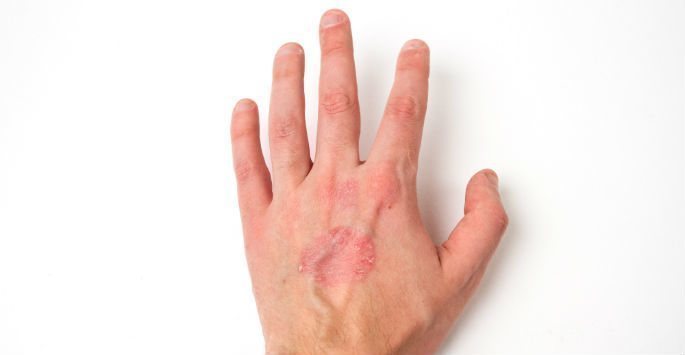It’s important for patients to recognize psoriatic arthritis symptoms in order to seek proper treatment, which can be very effective in reducing the effects of the condition.
Psoriatic arthritis is a form of arthritis that seems to be linked to skin psoriasis. This is an inflammatory type of arthritis that leaves sufferers with joint swelling and joint pain. It can eventually lead to permanent damage if steps are not taken to control the inflammation. Most people are able to prevent long-term joint damage by sticking to a regular routine of medication.
Psoriasis is a disease that causes your skin to turn scaly and red. Lesions can be seen throughout the body, but especially on the knees, elbows and scalp. This form of arthritis is usually diagnosed when a rheumatologist examines your clinical history, does an exam and looks at X-rays.
At times, individuals may develop the symptoms of the arthritis before psoriasis is visible on the skin. It is estimated that somewhere between 15 and 30 percent of individuals who are battling with psoriasis will eventually develop this form of arthritis.
Psoriatic arthritis is often seen in individuals between the ages of 30 and 50. However, there are examples of individuals suffering from this disease early on in childhood. Unlike other diseases that may favor men over women or vice versa, this type of arthritis affects men and women equally.
Both psoriasis and psoriatic arthritis are autoimmune disorders. Your body mistakes certain tissues as being dangerous, and so it tries to protect itself by causing these tissues to become inflamed. In skin psoriasis, the inflammation appears on your skin. However, in psoriatic arthritis, it is seen in your joints.
Like many other autoimmune disorders, this form of arthritis can range from a mild condition to something that is very severe and debilitating. There has been some link between the severity of a patient’s skin psoriasis and the severity of the arthritis in their joints.
Psoriatic arthritis symptoms can be seen in any and every joint in the body, or it may just affect one area. For example, it can affect all of your fingers or just one. When your fingers and toes are affected, they will look swollen. You may notice that your nails become thick and start to pit.
The good news is that psoriatic arthritis treatments are beneficial to the majority of sufferers. For example, there are certain anti-inflammatory drugs that may help in milder cases. Anti-rheumatic drugs may be prescribed as well. In some cases, drugs can be used to address both the skin condition and the joint disease.
Dealing with arthritis can be a challenge. Thankfully, it does not have to be a challenge that stops your ability to live life. Make an appointment at Arora Hand Surgery in West Bloomfield, Howell, Warren, or Macomb to learn about your treatment options. Contact us today to schedule a consultation.













